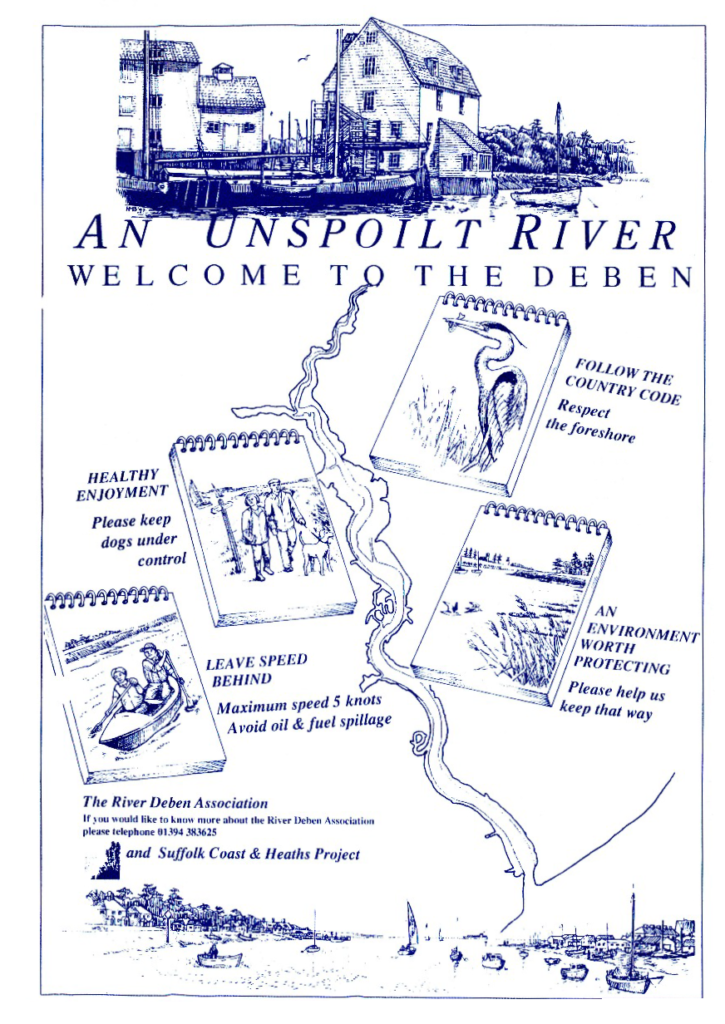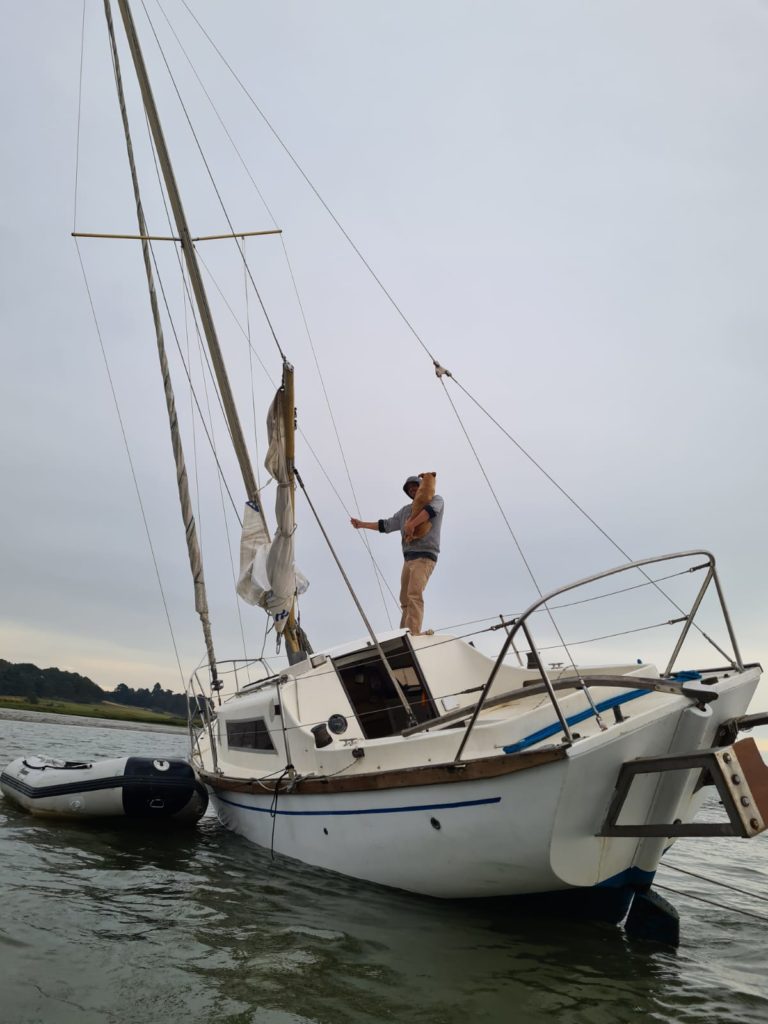By Bertie Wheen
…by a river we all call home, there was born an association.

Page 5 of the River Deben Association Newsletter, Spring 1997.
The year was 1990, and the shared aim of the 145 members gathered in the King’s Head that May was “to represent and reconcile the interests of all concerned with the future of the River Deben and its environs”. Their stated objectives were:
- To encourage any proposal which would safeguard the River and supports appropriate future developments.
- To resist any proposals which have a detrimental effect on the river and its environs.
- To help reconcile conflicting interests, and avoid confrontations.
- To establish a working relationship between the Association, River and Local Authorities.
- To maintain liaison with other interested groups.
In the years since, the Association has been an indispensable guardian of our incomparable River. The activities, views and knowledge of its members have been chronicled in its biannual publication, then called the River Deben Association Newsletter, now known as The Deben.
There have been 63 editions thus far, all of which are available both physically, at the Woodbridge Library, and digitally, here on this website. For that webpage, I have been going through the archives and adding their tables of contents to the list, in the hope that that will make it easier to:
- take a bird’s eye view, and see patterns over time;
- make it easier to find old articles.
Currently I have completed the first 19 issues, spanning the entirety of the 1990s. The first few were edited by Richard Hare, and the next 16 by Michael Atkins. (A remarkable feat, but incredibly not an unsurpassed one; the longest-serving editor to date is David Bucknell, who produced 18 and can be credited for shaping both The Deben and the Association’s modern forms. His story will, I hope, be told in a future article.)
It has been interesting to see how things have changed. I think there are lessons to be learned from looking back at the early days of the RDA, and ways in which we might better care for our home today.
I think that it’s particularly important to understand that environmentalism is not something new to this Association. Probably that comes from living in a place like this, where the beauty of being on and near the water nurtures awareness of the natural world and our symbiosis with it.
Discussed at that first meeting, and almost invariably present in the first decade of The Deben, is litter clearance. In the Autumn 1997 edition Michael Atkins noted:
“Probably the most important combined effort of the Association is the annual Litter Clean-Up.”
David Cavey agreed:
“I make no apologies for re-emphasising what a very worthwhile project the Clean-Up day is, and how important it is to keep up the numbers – particularly of young people.”
In Spring 1999, he added:
“This year, we increased to 5 skips, all of which were full to overflowing, yielding an estimated total of 4.2 tons. Over and above that, I would guess there were 30 black plastic bags deposited elsewhere by some groups.”
I’m not sure exactly when this stopped, but I think it was sometime in the 2010s. I am sure that it is a shame that it has, and that it should start again.
Another regular feature was Deben Reminiscences. The two with the greatest reach are Jill Atkins, who in the 10th edition one-upped Michael’s from the previous issue, starting hers:
“My husband’s reminiscences merely go back to 1954. I think that I can do better than that. I first came to Waldringfield in 1928…”
And Jim Turner, whose Autumn 1996 “Pre-war Reminiscences of the Deben” began:
“I suppose it would be about 1929 when I was first introduced to the Deben.”
Your attention need not be limited to those oldest memories; they are all time capsules containing sketches of a world I had only known from the Waldringfield History Group’s book. Sheila Starling remembers:
“The Rev Trev, otherwise Canon Waller, with his distinctive voice, used to sail the river in his Deben 4 Tonner single-handed, wearing his dog collar, and picking up his mooring immaculately just opposite the Clubhouse. There used to be about 6 Dragons, 6 Stellas and 10 Kestrels racing at Waldringfield, but there weren’t nearly so many moored boats to negotiate in those days. Harry Nunn built most of the Dragonflies at Waldringfield, and Ernie Nunn ran the boatyard and raced a Dragon. Albert and Grace ran the Maybush, and I have memories of Alan Mathieson playing an upright piano on the Maybush Lawn. They were happy days.”
In various places appear people whose names I had only read, contributing their own words. There’s Rev John Waller writing about the Yachtsman’s Service in 1992, and Rosemary Schlee on several occasions, including an article from 1995 titled “Island Cricket on the Deben”, just two pages before Oriel Laws, her daughter, recalling camping on the Tips as a teenager.
Another treat was in that same issue (#5), and in that with Rev Waller (#2), where you can find letters from the legendary Frank Knights, who owned the Ferry Quay with his wife Christine when I was growing up. I still live on the Ferry Quay, aboard the mid-20th-century Scottish MFV (Motor Fishing Vessel) Goldenray, and was shocked to discover that at the time (1990) Robert Simper counted only 41 houseboats (plus 9 liveaboards in mud berths) along the River’s saltwater stretch. The next issue had dramas with “the district council trying to rid Woodbridge of houseboats that do not have moorings in marinas and boatyards”. I’m glad that it’s not like that these days! Living on a houseboat is a joy, not something people should try to take away the right to do.
Anyway, while writing this I am aware that it is well past the time that RDA Journal articles usually go up. Instead of going on about the delights you might find, I will simply recommend that it is worth looking for yourself.
Read the next post – News from the Noughties, Part I – out now!
Bertie Wheen is, amongst other things, proud to be the typesetter of The Deben (and – full disclosure – the Waldringfield History Group’s book). He has recently started a maths degree at the Open University, and lives on the River (where he now has a yacht, Jupiter, currently ashore in Everson’s yard) with two dogs, Solo and Nellie.

